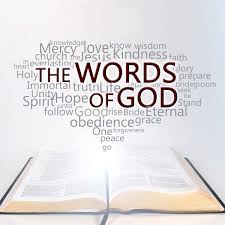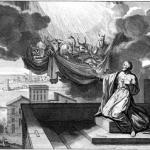In the beginning was the Word . . . and the Word was made flesh, and dwelt among us. John 1:1, 14
“In the beginning was the Word . . .” ranks right up there with “Once upon a time . . .” as one of the best-of all-time intro lines to a story. The opening verses of John provide a beautifully poetic introduction to the greatest story ever told. Because the language is poetic rather than discursive, in these verses the author of John has provided two millennia of theologians and persons of faith with more to write, talk pontificate, preach, argue, and be confused about than could possibly be exhausted in future millennia.
Logos, the word translated from the Greek as “Word,” has many possible meanings, including “word,” “thought,” “principle,” “speech,” and “reason.” That the author chose logos to begin the story opens the door to all sorts of possibilities . . . but not to the possibility that many Christians, including those in the evangelical Protestant world in which I grew up, insist upon. The first chapter of John makes it clear that the Word is not a text or a book, nor is it a collection of doctrines, dogmas, and traditions. The Word is a person.
Of the many conversations I have had over the years with Christians who believe that the Bible is the literal, inerrant Word of God, I remember as if it was yesterday a conversation (debate? Disagreement?) I had with someone on social media several years ago concerning the opening verses of John’s gospel. In response to my suggestion that the Bible is a special book, but one written by human beings rather than dictated by God, the other person responded that anyone who denies the inerrancy of scripture cannot legitimately call themselves “Christian.” Rejecting scriptural inerrancy is the same as rejecting the authority of God in one’s life.
I responded, rather defensively, that I found it sad to imagine a faith so narrow that it claims that God is confined within the covers of a book. That God somehow is incapable of speaking directly to contemporary human beings. That the Word of God is a book rather than a Person. God is brought into the world through human beings, not ancient texts.
I could have done better. I could have used the very book that the fellow I was arguing with worships to make my point as the next participant in the conversation did succinctly in short order by simply using John’s gospel:
John 1:1—In the beginning was the Word. John 1:14—And the Word was made flesh and dwelt among us . . . The Bible isn’t the Word of God, but it can lead us to the Word of God.
The Word is not a book, in other words. The Word is a Person.
Words have been a central focus of my life since my earliest memories. There have been few times in my life when a book was not within arm’s reach. My early years were full of apocryphal stories of how I learned to read. According to my mother, I was reading by age three without anyone having taught me how to do it. I was never without a book, and lined up my menagerie of stuffed animals on the couch to read to them. I knew how to read before I could tell time or tie my shoes—perhaps my parents should have provided me with shoe-tying instruction manuals to read.
In “An Essay on the Concept of Reading,” Simone Weil reminds us that reading is more than deciphering words on a page:
There is a mystery in reading, a mystery which, if we contemplate it, may well help us, not to explain, but to grab hold of other mysteries in human life. . . The sky, the seas, the sun, the stars, human beings, everything that surrounds us is something that we read.
This insight includes a much broader understanding of “reading” than our traditional Western conception which considers reading to be an exclusively cognitive, intellectual, and mental activity—precisely the sort of activity I’ve spent the majority of my waking hours on this planet doing. Accordingly, I was grateful to discover a new kind of reading several years ago while on sabbatical.
I had heard about “lectio divina,” sacred reading, before I went on sabbatical to a Benedictine college campus with a large abbey on site over a decade ago, but it had not struck me as a particularly interesting concept. Just another skill to learn, technique to master, perhaps—but really, I thought, if there’s one thing I know how to do pretty well, its reading. After several weeks of daily prayer with the abbey monks, it dawned on me that lectio divina isn’t about words, meaning, or retention at all.
I often found that I did not remember, even for the amount of time it took to walk from the choir stalls to the front of the abbey and exit, which psalms we had read nor any of the content. Yet I had a sense that what we were doing was far more important than reading a book, marking it with highlighter and pen in my usual method, and perhaps memorizing a phrase or two for future reference in class or conversation.
What was happening in the choir stalls was not a mind event, but a full body experience bypassing my overdeveloped mind and seeping into all the other parts of me that had been starved for years. My bodily rhythms, my intuitions, my emotions, my spirit. The Psalms speak of God’s word all the time, but almost never of thinking about God’s word.
It’s more like what Jeremiah reports: “Your words were found and I ate them, and your words became to me a joy and the delight of my heart.” Simone Weil was channeling her internal Jeremiah when she wrote that “I only read what I am hungry for at the moment when I have an appetite for it, and then I do not read, I eat.” And like a mother bird regurgitating food for its babies, an important word or phrase would come into my consciousness later in the day, one that I didn’t remember reading but which had seeped into my soul.
In our “real world” of immediacy, getting it done, making money and a living, is there a place for what I began to absorb in a monastery abbey in the middle-of-nowhere Minnesota? Over the subsequent years I’ve seen small but important evidence of change in how I converse with people, how I approach the day, and a heightened and more immediate sense of when a layer is threatening to grow back over my divine reading space.
Learning how to read differently is not just another technique; because it is a new way of being, it is transferable to everything. I went on sabbatical expecting to write about trying to sustain a life of faith when God at best is a silent partner who never writes, calls, emails, texts, or tweets. Now the divine is everywhere and seems to have a lot to say. Reading the divine begins with believing that everything is sacramental, infused with the breath of God, with taking “the Word became flesh” very seriously. All of creation is a sacred text. What are you reading?













